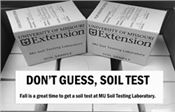Inexpensive Soil Tests Can Save Farmers Thousands

Fall is the best time to submit soil samples.
Fall is the best time to submit samples.
COLUMBIA, MO.
Soil tests can save farmers thousands of dollars, says Manjula Nathan, director of the University of Missouri Soil and Plant Testing Laboratory.
Too often, farmers follow routine fertilization schedules and end up applying too much fertilizer to fields, Nathan said. A simple soil test gives the farmer accurate information to guide nutrient management decisions.
Two Lawrence County farmers shared their savings stories with MU Extension agronomist Tim Schnakenberg.
One farmer had fertilized his cattle pastures every year with the same fertilizer. “He budgeted a lot of money to do it,” Schnakenberg says.
One year, he spent $270 on soil sampling. He reported saving $20,000 that he would have spent on fertilizer. Another businessman bought a farm and budgeted $10,000 for nutrients. He spent $85 for soil tests that showed that nutrient levels were fine. “Soil testing is a great investment compared to the cost of lime and fertilizer over several acreages,” Schnakenberg says.
In other cases, however, soil tests show low fertility levels. Area MU Extension agronomists can review test results with farmers and make unbiased, research-based recommendations to build up fertility levels.
Fall is a good time to submit soil samples, Nathan said. The lab processes about 32,000 field crop tests annually. Spring is the busiest time. Sampling in fall gives producers sufficient time to make plans for fertilizer applications.
You can take samples to your county MU Extension center or mail them directly to the lab on the MU campus. A basic soil test is $10 per sample if you submit directly to the lab. There is a small shipping charge if you take samples to an MU Extension center.
The MU soil and plant testing lab has a one-day turnaround time. Regional agronomy and horticulture specialists and firms with accounts at the lab receive the soil test results by email on the same day they are processed. Users may also access soil test results online with a password. If you are receiving results by mail, it takes about seven to 10 days from submission to county extension offices to receipt of results.
“Soil testing is an essential management tool for efficient nutrient management that results in improved production and optimized returns,” Nathan said.
The Soil Testing and Plant Diagnostic Services website at soilplantlab.missouri.edu has downloadable submission forms, instructions for taking and submitting soil samples, information about available tests, and a guide to interpreting test results. For questions, call 573-884-4288 or email soiltestingservices@missouri.edu. ∆